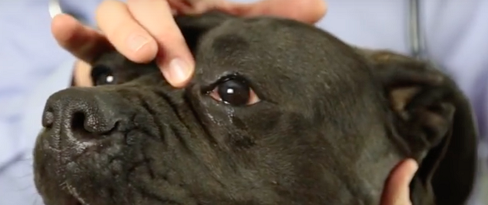Is there a way to treat cherry eye in dogs without surgery?
Original Question: What should I do about my dog’s cherry eye? Surgery is expensive and I wanted to know if there’s another remedy that would help. - Archie
 May 17, 2018
May 17, 2018
Hi Archie,
Thanks for your question.
‘Cherry eye’, also known as prolapse of the third eyelid gland, is a condition where a tear-producing gland that normally sits below the lower eyelid pops up into view. It can rub the eye and cause irritation and over time the gland may start producing less tears which can lead to other problems such as infection, keratitis and ‘dry eye’. It is recommended that it be treated before these problems occur.
My first recommendation is to massage the gland back down into place as soon as possible. The longer it has been out, the less likely it is to stay down in its normal position once you replace it there. In 15 years of practice, I may have seen one case where the gland remained in place after massaging it back down below the lower eyelid. You can ask your veterinarian to perform this but quite frankly, it often pops back up before the dog leaves the clinic.
There are a few different surgeries that can be done to repair this. They are usually recommended when your dog is under general anesthesia for their spay or neuter surgery. The reason why multiple different surgical techniques exist is because there is no one surgery that is agreed upon as the best. Their effectiveness is not 100% and you can have the condition recur even after the surgery. Some veterinarians will perform these surgeries but many will not and you may have to visit a specialist to have it performed. The specialist will have the added benefit of greater experience than a general practitioner and therefore will likely have a greater chance of success. It is absolutely imperative that you take care of the eye after the surgery by following the post-surgical treatment plan and making sure your dog doesn’t rub it’s eye or else the chance of it recurring becomes greater.
For more information, you can watch our video “Cherry Eye in Dogs and How to Treat It Properly” where I discuss this disease with Trudy, a large dog who presented with cherry eye.
Best of luck,
Dr. Greenway
Disclaimer: healthcareforpets.com and its team of veterinarians and clinicians do not endorse any products, services, or recommended advice. All advice presented by our veterinarians, clinicians, tools, resources, etc is not meant to replace a regular physical exam and consultation with your primary veterinarian or other clinicians. We always encourage you to seek medical advice from your regular veterinarian.

